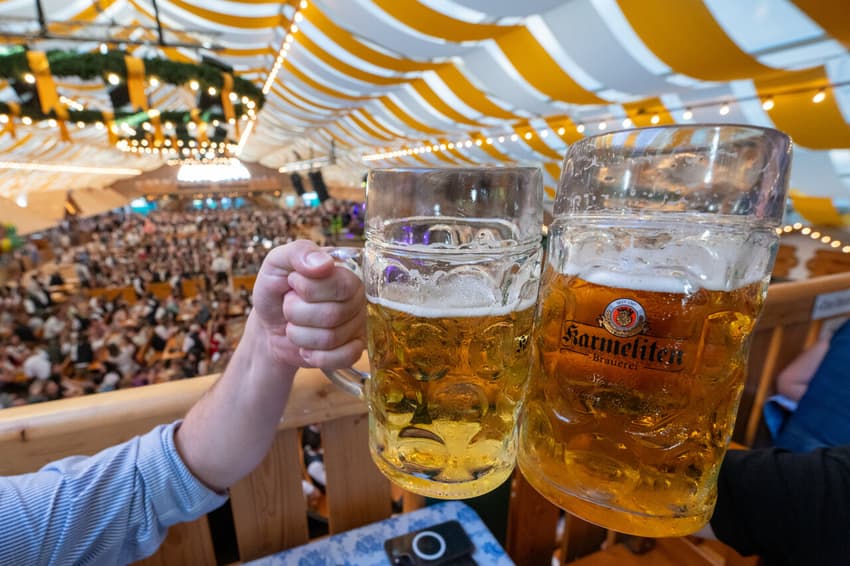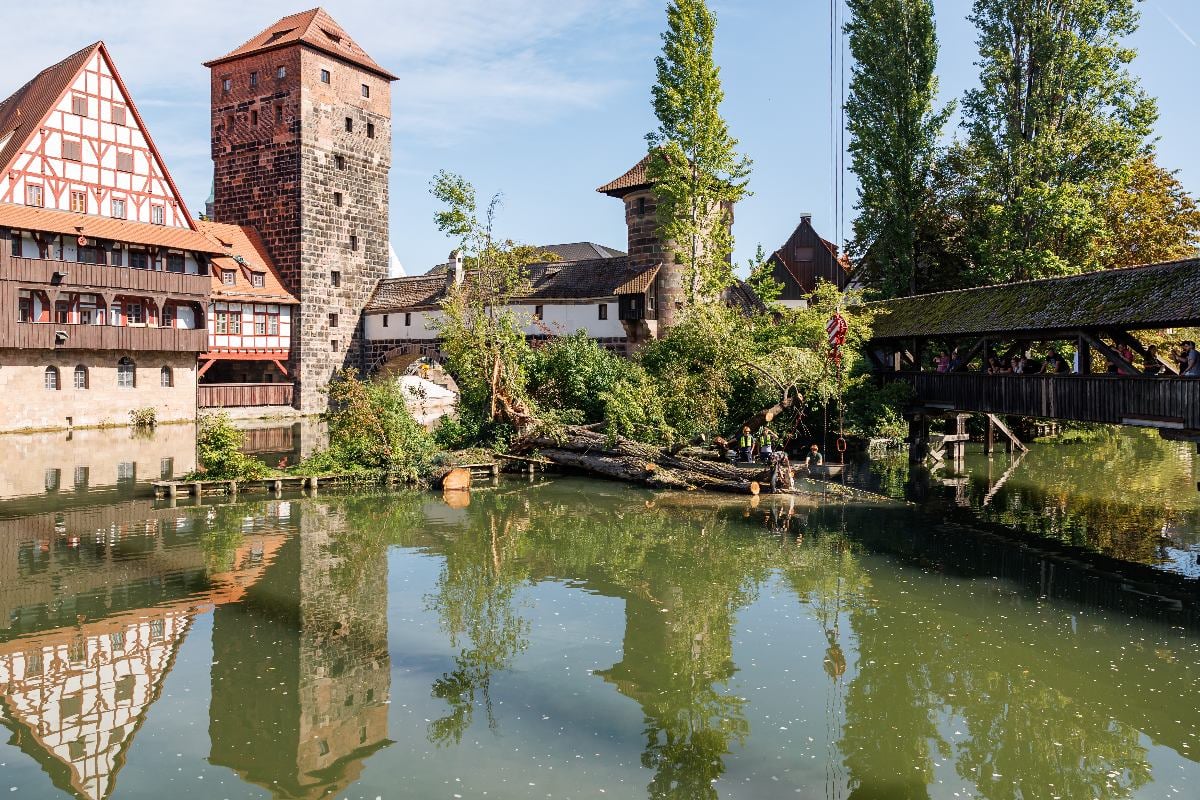Living in Germany: Skilled worker shortage getting worse, Bundestag dome mix-up and beer culture

In this week's roundup we talk about the growing issue of Germany's worker shortage, an embarrassing political mix-up involving the Bundestag dome and the significance of German beer culture.
Living in Germany is our weekly look at some of the news and talking points in Germany that you might not have heard about. Members can receive it directly to their inbox on Saturday.
Skilled worker shortage in Germany laid bare in new report
We published a story this week on a survey that shone a light on Germany’s recruitment problems. The latest ifo Business Survey, which keeps in touch with around 9,000 companies throughout Germany, found that the need for skilled workers is going up. According to the survey results, 43.1 percent of firms reported suffering from a shortage of qualified workers in July, up from 42.2 percent in April 2023. The situation will only get worse in future. The main issue is demographics - many people are leaving or are due to leave the workforce to retire - but not enough people are joining it. The Institute for Employment Research (IAB) calculated that the labour market is at risk of losing seven million people in Germany to retirement by 2035.
To combat this, the German government has been working on an overhaul of immigration laws to make it easier for people to come to the country and work, as The Local has extensively reported on. Experts say the focus has to be on nations from outside of Europe because nearby countries, like Spain, Italy and France, are facing similar demographic issues. Meanwhile, in countries where traditionally people have moved to Germany for work - such as Poland and the Czech Republic - the labour market situation has improved, making emigration less of an attractive option. But Germany can’t just rely on immigration; more has to be done to get residents into the workforce. One way of doing that is to make work more attractive, whether it’s offering better pay or more perks.. A new initiative testing out a four-day work week in Germany could offer up a solution. Whatever the case, Germany will need to take action now to prevent a crisis in the future.
Tweet of the week
The opposition Christian Democrats (CDU) were left red-faced this week after they accidentally used an image of the Georgian palace instead of the German Bundestag in their new logo. The party then released a tweet poking fun at themselves, saying: “We had a lot of domes to choose from and have now picked the only right one.”
Where is this?

Photo: picture alliance/dpa | Daniel Karmann
Perhaps you recognise the architecture in the Bavarian city of Nuremberg in this photo. And if you look closely, you’ll spot workers trying to salvage a 100-year-old poplar tree that fell into the Pegnitz river on Wednesday night. No one was injured and there was no damage to the surrounding buildings including the Maximillian Bridge. The tree was a popular Nuremberg landmark. According to the city, these types of poplars can live for around 100 to 120 years. As they age, they become brittle and can break during storms.
Did you know?
Germans love their beer - and rightly so because it is delicious. But did you know how embedded beer culture is in Germany? Christina Schönberger, a brewing engineer at Nuremberg-based BarthHaas, a Hops supplier to brewers, told the Germany in Focus podcast recently that beer has been “an integral part of German culture for many centuries''. But she pointed out that there have been big changes over the years brought about by different influences.
Germany still has many family-owned mid-size breweries in operation, as well as larger companies. “A big part of the family-owned companies date back to the 18-and-1900s where the possibility was given to basically, in an industrial fashion, produce bottom fermented beers (such as pilsner and lager) - that’s when a lot of breweries opened up,” said Schönberger. “We also still have a couple of breweries that go back to the 10th, 11th or 12th centuries from monasteries where there were a lot of monks involved in brewing in a religious context.”
Schönberger said it’s only in the last 200-300 years that wheat beers emerged into the culture. There have been “a lot of influences throughout the centuries that brought beer to the level of cultural importance that it has today,” she said. Meanwhile, beer experts are noticing a change in trends, with more Germans drinking alcohol-free beer. “I think it’s very good because alcohol is actually the only part of beer that doesn’t make beer a super healthy drink,” said Schönberger.
Comments
See Also
Living in Germany is our weekly look at some of the news and talking points in Germany that you might not have heard about. Members can receive it directly to their inbox on Saturday.
Skilled worker shortage in Germany laid bare in new report
We published a story this week on a survey that shone a light on Germany’s recruitment problems. The latest ifo Business Survey, which keeps in touch with around 9,000 companies throughout Germany, found that the need for skilled workers is going up. According to the survey results, 43.1 percent of firms reported suffering from a shortage of qualified workers in July, up from 42.2 percent in April 2023. The situation will only get worse in future. The main issue is demographics - many people are leaving or are due to leave the workforce to retire - but not enough people are joining it. The Institute for Employment Research (IAB) calculated that the labour market is at risk of losing seven million people in Germany to retirement by 2035.
To combat this, the German government has been working on an overhaul of immigration laws to make it easier for people to come to the country and work, as The Local has extensively reported on. Experts say the focus has to be on nations from outside of Europe because nearby countries, like Spain, Italy and France, are facing similar demographic issues. Meanwhile, in countries where traditionally people have moved to Germany for work - such as Poland and the Czech Republic - the labour market situation has improved, making emigration less of an attractive option. But Germany can’t just rely on immigration; more has to be done to get residents into the workforce. One way of doing that is to make work more attractive, whether it’s offering better pay or more perks.. A new initiative testing out a four-day work week in Germany could offer up a solution. Whatever the case, Germany will need to take action now to prevent a crisis in the future.
Tweet of the week
The opposition Christian Democrats (CDU) were left red-faced this week after they accidentally used an image of the Georgian palace instead of the German Bundestag in their new logo. The party then released a tweet poking fun at themselves, saying: “We had a lot of domes to choose from and have now picked the only right one.”
Where is this?

Perhaps you recognise the architecture in the Bavarian city of Nuremberg in this photo. And if you look closely, you’ll spot workers trying to salvage a 100-year-old poplar tree that fell into the Pegnitz river on Wednesday night. No one was injured and there was no damage to the surrounding buildings including the Maximillian Bridge. The tree was a popular Nuremberg landmark. According to the city, these types of poplars can live for around 100 to 120 years. As they age, they become brittle and can break during storms.
Did you know?
Germans love their beer - and rightly so because it is delicious. But did you know how embedded beer culture is in Germany? Christina Schönberger, a brewing engineer at Nuremberg-based BarthHaas, a Hops supplier to brewers, told the Germany in Focus podcast recently that beer has been “an integral part of German culture for many centuries''. But she pointed out that there have been big changes over the years brought about by different influences.
Germany still has many family-owned mid-size breweries in operation, as well as larger companies. “A big part of the family-owned companies date back to the 18-and-1900s where the possibility was given to basically, in an industrial fashion, produce bottom fermented beers (such as pilsner and lager) - that’s when a lot of breweries opened up,” said Schönberger. “We also still have a couple of breweries that go back to the 10th, 11th or 12th centuries from monasteries where there were a lot of monks involved in brewing in a religious context.”
Schönberger said it’s only in the last 200-300 years that wheat beers emerged into the culture. There have been “a lot of influences throughout the centuries that brought beer to the level of cultural importance that it has today,” she said. Meanwhile, beer experts are noticing a change in trends, with more Germans drinking alcohol-free beer. “I think it’s very good because alcohol is actually the only part of beer that doesn’t make beer a super healthy drink,” said Schönberger.
Join the conversation in our comments section below. Share your own views and experience and if you have a question or suggestion for our journalists then email us at [email protected].
Please keep comments civil, constructive and on topic – and make sure to read our terms of use before getting involved.
Please log in here to leave a comment.